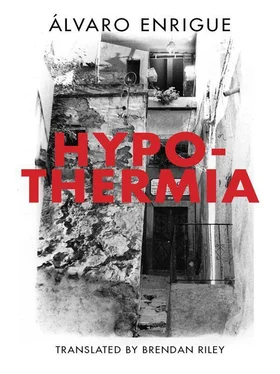Australians were the dregs of British society; their country was a penal colony that became a nation. Besides there being something heroic in that assertion, there’s also a real identification between the land and its occupiers: Australians are from Australia . We gringos can’t even boast that much: we’re the scum of the earth, the leftovers from all the other countries that came looking for a second chance.
It’s nothing to laugh about. You were born here and they convinced you in school that it’s the best country in the world, but sure enough, your father or your grandfather didn’t think that way, did they, because they came from somewhere else.
Isn’t that right?
This country is nameless, and we as its inhabitants have chosen, consciously and consistently, to have no patronymic: Salvadorans are Salvadoran, Chinese are Chinese, and the French are French. Gringos? We’re African Americans, Mexican Americans, Native Americans, German Americans, Irish Americans. A woman at the Bank defines herself as a Bohemian American, and nobody remembers anymore, not even in the Czech Republic, that Bohemia was once a nation under Austro-Hungarian protection. We’re neither an empire, nor a republic, nor a monarchy. We’re nothing: it’s every man for himself because no one wants to belong to the world of second chances. We’re whatever slipped through the cracks of history: pure ambition without any ulterior commitments — a ragtag band of pirates. We’re gringos and we urgently need some national therapy.
Don’t laugh. Think of it as a business opportunity and you’ll see that I’m right.
Sown in dishonor, it is raised in glory.
I CORINTHIANS 15:43
He told her that he’d gone to church one day and that the Polish baritone had just disappeared, his wife and all their children too: now they hadn’t been to Mass in three weeks.
He said it apropos of nothing, simply to fill up a moment of silence, perfectly aware of the fact that this was the first she was hearing about the singer. It was an incidental sort of anecdote, and he probably thought to bring it up just for a laugh, but it pulsed with something sadder and less explicable: talking on cell phones made him tense because — he thought — it conjures up a frustrating and illusory sense of nearness; information is accelerated but nothing is communicated, at least not in the strict sense of the word. No matter how much you want it to, an empty, disembodied voice does not represent an act of communion. He felt that their calls were like some exam that he had to pass, or simply survive.
Sometimes they talked for a specific reason — to agree on a cover story, to avoid some careless slip — but most of the time they called each other just to call. It was a ritual, an act of acquired, gratuitous risk, something that had begun one day and quickly acquired a life of its own: at one time it would simply have felt right now and then to call, but now it was a ritual, something they’d come to expect. Sometimes it was a good call, sometimes not, but it formed a strand in a vast web of expectations and anxieties to which they were now well accustomed. Perhaps those ten minutes plundered from the wasteland of the day helped them — like going to church — to show each other that they weren’t gringos, not yet, not completely.
They’d been chatting about how the big, full congregations seen at the Spanish Masses were so moving: the preposterously criminal in the same throng as the faithful, he said. Then he explained how, in spite of that, he preferred the cosmopolitan coldness of the nine o’clock Mass — in English: with Filipinos, Lebanese, Irish, Koreans, Italians — because, for one, it was progressive and distinguished; then, for another, it provided him with the opportunity to witness the weekly skirmish in the Polish baritone’s ongoing battle.
Either the singer and his wife were the last gringos attentive to the Vatican’s stance on reproduction or they had learned from the Irish that all triumphs are, in the end, statistical; the Protestants would have to be beaten through sheer numbers. At the Hispanic Mass, their seven unwashed children wouldn’t have seemed such a terrible disaster, but compared to a typical English-speaking family — a few adults and a single child — they were absolutely scandalous. Seven? she asked him, thinking he must be exaggerating. Seven, he answered, five boys and two girls.
Before the watchful eyes of the parish, the clan had grown to an uncontrollable size, and the children’s disarray had naturally increased in direct proportion to their quantity: the younger ones’ clothing had already been worn threadbare by their older siblings, who were also better fed. The mother, a beanpole of suspiciously Calvinistic propriety and severity when times were good, had gone flabby, swollen, and purple beneath some dresses that were, by now, quite snug. The baritone was still red-faced and robust but his beard was badly trimmed and his tennis shoes were a disgrace; the alterations stitched into the underarms of his shirts gave notice of a sudden, unhealthy increase in weight. They would have been a normal enough family in the 1970s, a time when modesty was not yet considered a defect, but among the perfectly trimmed and outfitted congregation at nine o’clock Mass they seemed more like a band of castaways.
There was a time — by now a part of the parish mythology — when the baritone attended Mass from his place on the musicians’ risers, to the right of the altar, his back to the organist, lavishly pouring out his implacable voice alongside a Ugandan woman draped in curtain-like dresses. His proliferating offspring, however, obliged him to move down to mingle with the multitude: his wife found it impossible to maintain order among the children herself. There were three or four unbearable Masses before the singer decided to leave stardom behind, urged forward — it was murmured — by the priest, who could no longer continue casting the pearls of his religious office before a herd of swine being distracted by a bunch of little brats fighting over some completely wornout toy.
The opening section of the first Mass that the baritone spent back on terra firma felt something like a surrender: likely prompted by resentment, he didn’t allow himself to be tempted by the music, and the truth is that he was missed: his singing talent was far too good for a church like that. His children still behaved quite badly, only tempered now by a certain shyness; it seemed that the fat man, who did nothing to control them, only barely commanded their respect. The Ugandan woman sang alone up to the Acclamation, when the Pole couldn’t stand it any longer and quietly, humbly joined in singing with the rest of the faceless congregation. To hear his voice again amid the Hosannas was like a soothing balm: in the end, the main reason for attending Mass during eras when faith seems to be on the wane is to demonstrate that, regardless of how prodigal he has been, the son can always return home; that one is permitted to follow a little in the footsteps of his parents and grandparents.
So, are you taking the girls? she interrupted him. He’d been so focused on sustaining the flow of his narrative that he didn’t see her curveball coming. Where? To church. Of course, he said, it’s good for them, a civilizing influence: the Mass is the story that explains all the other stories, even if I don’t believe in it. I do. I’m jealous. And does she go? Who? Your wife. He hesitated a bit before answering. Sometimes. Isn’t she Lutheran? Yes, and that’s why.
The duet remained stable for a few more Masses: the Ugandan woman on the riser — a goddess in drapery — and the Pole in the pews below, an exiled Romeo. But nothing lasts forever, he said; bound by duty, the Ugandan woman heeded her community’s call, becoming the regular soloist in the choir at the twelve o’clock Mass with its congregation composed of recently arrived African immigrants.
Читать дальше












